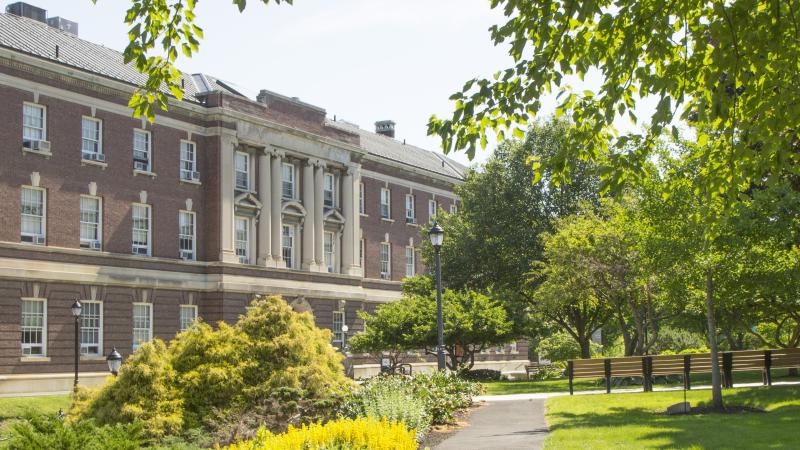May 15, 2020

In a typical year, the students graduating with bachelor’s degrees from the Department of Science and Technology Studies (STS) in the Rensselaer Polytechnic Institute School of Humanities, Arts, and Social Sciences would give public presentations of their thesis projects at the end of the spring semester. Of course, 2020 has been anything but a typical year. Due to the COVID-19 pandemic, such a gathering was not possible.
“For their diligent work conducting social research that addresses some of the world’s most urgent needs, each of our students in the Class of 2020 deserves to be celebrated — even if it’s just in a public posting rather than our usual panel presentations,” said Abby Kinchy, a professor in the STS department. “Their work demonstrates how the social sciences and humanities can produce key insights into the impacts of science and technology and can provide guidance for developing more sustainable and ethical practices.”
The STS department at Rensselaer offers three majors: Sustainability Studies; Design, Innovation, and Society; and Science, Technology, and Society. Many STS students in the Class of 2020 felt the call to explore food production and consumption, key sustainability issues that the social sciences are equipped to address. Ryan Morrison developed a two-pronged approach to addressing whale entanglement off the Maine coast. He designed an alternative lobster trap while also analyzing local lobstering legislation to identify changes that could save whales. Fiona Wisehart compared how different farming organizations are addressing the need for climate action. Makayla Wahaus explored how women are contributing to a sustainable local food system through Community Supported Agriculture. Thomas Carton designed a model through which hemp waste from New York farmers might be directed to a business that would manufacture hempcrete, minimizing agricultural waste and creating low-emissions construction materials. Finally, in order to bring permaculture into people’s homes, Julianna Chiaramonte developed a useful, beautifully illustrated guide for those who live in apartments to tend to their own gardens indoors.
Some students examined the effectiveness of environmental interventions. Kayla Danks found viable models of green infrastructure for climate change-related disasters in local communities, suggesting the importance of community collaboration with local government. Maya Sanders compared climate change legislation in New York and California, and made a podcast to communicate what they learned. Sam Alderete investigated the role played by local media in raising public awareness about environmental justice issues. Daniel Morrissey designed a guide for the process of deconstructing old buildings to enable their regeneration in cities like Troy.
Another area of research graduating STS students pursued was improvement in environmental education. Jeanine Moreau developed an educational board game that guides children to consider balances and imbalances in the food chain depending on human intervention. Justina Thompson investigated decolonial educational models, arguing for a community-centered approach to research. In community-based research on urban farming and climate change education at the Radix Ecological Sustainability Center, Ari del Tufo advanced our understanding of how difficult subjects like climate change and environmental justice can be engaged with in ways that empower people, especially youth, to make a difference in their own communities.
Students also considered how sustainability relates to religion, fashion, gender, and other aspects of culture. Peter Gramenides explored the relationship between Eastern Orthodox views on environmentalism and the way calls to environmental action are integrated into the practices and sermons of local congregations. Ciaran Young investigated the gender dynamics of campus environmental organizations and university influences on environmentalism. Ashley Ontiveros probed the consumption practices of college peers to understand the disjuncture between fast fashion-consumption-waste knowledge and practice, and created a public video tutorial demonstrating ways to repurpose old clothing and textiles.
The crucial dimension the social sciences play in health research was reflected in the work of graduating students. Hannah Lightner contributed new understandings about the gaps between policy and practice in international medical missions. Beck Corby analyzed the relationship between the medical industrial complex and nonbinary gender identity. Alex Ngan’s work on sexuality and transmasculinity has led him to design a sex toy for transmasculine people that could help to heal feelings of body dysmorphia. Hazelle Lerum investigated the ways popular literature about polyamory employed evolutionary tropes. Talei Moore wrote about race-based trauma and healing in holistic health care and support networks for black women.
Taking a critical look at the role of artificial intelligence in media technology, Nicolas Robinson analyzed the presentations of emerging tech entrepreneurs. Alvin Yu researched a variety of factory rehabilitation projects, collecting best practice approaches and providing a blueprint for governments to transform old gasworks or coal factories into lively community spaces. Their work shows how social research can illuminate the process of innovation in diverse domains, helping to recognize the cultural and political aspects of technological change.
“In this moment of worldwide crisis, it is clear that we need major innovations to support public health, environmental sustainability, and the public good,” Kinchy said. “The social sciences are especially important for meeting these interlinked challenges, and these students will play important roles in helping to create paths toward a better future. While we can’t be with them in person, the STS department wishes them all the best.”